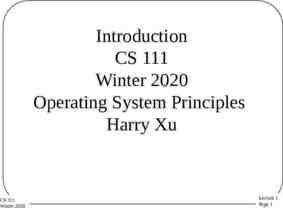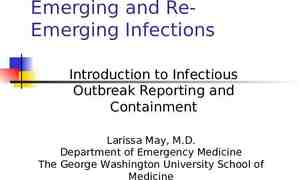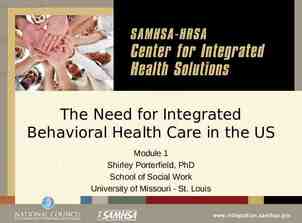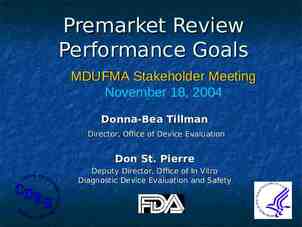Resource Family Approval (RFA) Criminal Record Background Checks April
67 Slides179.92 KB

Resource Family Approval (RFA) Criminal Record Background Checks April 20, 2018

Objectives Eliminate confusion around criminal history information Discuss “clearances” vs. “exemptions” Discuss new standards Understand how administrative actions are a part of the process

Basic Overview RFA Background Assessment Guide (BAG) Outside the Scope: CBCB Evaluator Manual (EM) Child specific placement issues

QUESTION

Question #1 If we do a CLETS check for a relative and they have a conviction, can we just grant a simplified exemption so we can place the child on an emergency basis?

Answer #1 No. Exemption decisions are always based on live scan results and cannot be based on a CLETS check. The County can make an emergency placement based on a CLETS check pursuant to Welfare and Institutions Code (W&IC) 309 and 361.4. A live scan fingerprint check must be initiated within 5 business days of the emergency placement or within 10 calendar days following the CLETS check, whichever is sooner. The County would then proceed with the appropriate exemption process based on the live scan results.

Legal Authority WIC 16519.5 Health and Safety Code1522 Family Code 8712 Written Directives

What is Part of the Background Check? Fingerprint-based search of information through the California Department of Justice (DOJ) including: State and federal criminal history information (convictions and arrests). Substantiated CACI reports of abuse and neglect. Self-disclosed criminal history RFA 01B A Megan’s Law registered sex offender check. LIS/AARS Checks DMV Database (for individuals who will drive child)

QUESTION

Question #2 Our county has a court database system that we check for criminal history. If an individual discloses nothing on the RFA 01B and there are no hits on the CORI, can we use information we found in the court database to make the individual go through the exemption process?

Answer #2 No. The county does not have discretion to add additional databases to the background check components. The county should not deny or delay a clearance if all the components of the background check specified in the Written Directives indicate that the individual has no criminal or CACI hits.

Who Has To Print? WIC 16519.5 “ Criminal records clearance of each applicant and all adults residing in, or regularly present in, the home, and not exempted from fingerprinting, as set forth in subdivision (b) of Section 1522 of the Health and Safety Code, pursuant to Section 8712 of the Family Code, utilizing a check of the Child Abuse Central Index (CACI), and receipt of a fingerprintbased state and federal criminal offender record information search response. The criminal history information shall include subsequent notifications pursuant to Section 11105.2 of the Penal Code.”

Regularly Present There is no specific definition of “regularly present.” Do not create general rules around single factors, such as: A shared mailing address An applicant’s marital status The County must determine who is regularly present in the home on a case-by-case basis.

QUESTION

Question #3 I have an applicant whose husband is in prison, but he’s supposed to be released in a few months. Should I wait until he is released before moving forward with the RFA process so we can fingerprint him?

Answer #3 No, you would move forward with the RFA process. Only individuals who are currently residing or regularly present in the applicant’s home are required to fingerprint. Once the husband is released, he will be required to complete the criminal record background check process if he resides or is regularly present in the applicant’s home.

When you receive the CORI Notice CORI Case of Convictions/Arrest (RAP sheet) Disclosure Law: Gresher (2005) 127 Cal.App.4th 88 The individual who is required to obtain an exemption must be notified, in writing, of the specific convictions listed in the summary criminal history received

Adverse Action ASSEMBLY BILL (AB) 2343 (CHAPTER 256, STATUTES OF 2012) Whenever the information from the CORI results in an adverse decision to an individual subject to a criminal background check pursuant to HSC section 1522, the individual must be expeditiously furnished with a copy of his or her record, even if the individual has not requested one.

QUESTION

Question #4 We just include the convictions in the Exemption Needed letter that is sent to the individual. Can we just keep doing that?

Answer #4 The County can include the specific convictions in the Exemption Needed letter; however, you should also attach a copy of the full CORI. The individual is entitled to receive the same information that the County received as a result of the Livecan fingerprint check.

What is a Conviction? Health and Safety Code section1522(f) – A conviction means a plea or verdict of guilty or a conviction following a plea of nolo contendere. Generally there is a conviction when: 1)A plea is entered; and 2)A penalty and/or probation is imposed.

Shifts in Burden Initial burden is on the government to prove the conviction. Meeting this burden is important because the conviction may be the basis for denial/rescission and may be appealed to a administrative hearing. Once this burden has been met, the burden shifts to the individual to provide substantial and convincing evidence of present good character, thereby qualifying for an exemption.

QUESTION

Question #5 The CORI says the person was recently charged with petty theft and was sentenced to 12 months probation, but it also says there is “No Dispo Available.” Do I have to go get the court records before I send out the Exemption Needed notice?

Answer #5 No, you do not need to obtain court records prior to sending out the Exemption Needed letter. If the person requests an exemption, court records are one of the required documents that must be submitted as part of the person’s exemption request. The County may ultimately have to obtain the court records if the person is unable to do so and the County wishes to deny the exemption request.

Arrest-Only Investigations Health and Safety Code section1522(e) mandates investigation of specified serious offenses. The arrest entry on the CORI is not sufficient to deny a clearance. Investigation must yield evidence of conduct that is admissible at hearing to prove conduct that poses a risk. Burden of proof for criminal proceedings is higher. Legal consult will help determine the appropriate Administrative Action.

Clearances If there are no convictions, substantiated child abuse, or a serious arrest, the individual is entitled to a “clearance.” However, remember that a clearance does not mean an applicant will be approved as a Resource Family. The background check is only one component of approval.

QUESTION

Question #6 A person living in the home of an RFA applicant has 2 arrests for non-exemptible crimes. However, the person was never convicted. Can we send the Exemption Needed letter to them so they have to go through the exemption process?

Answer #6 No. If the arrests did not result in any convictions, the individual does not need an exemption. In fact, if the individual was convicted of those crimes, he or she would be ineligible for an exemption. However, in this case, the county is required to conduct an investigation of those arrests, because they fall under H&SC 1522(e). If there is evidence of conduct that poses a risk or threat to the health and safety of a child or nonminor dependent, conduct a legal consult to determine the appropriate administrative action. 2018 Attorney-Client Privileged Communication

Convictions and Exemptions GENERAL CONVICTION RULE: An individual with a conviction is disqualified from approval as a Resource Family or residing or being regularly present in the Resource Family’s home.

Convictions and Exemptions For (CONT’D) most crimes, the conviction rule is rebuttable, meaning an individual may obtain an EXEMPTION from disqualification in one of two ways: 1)Qualifying for the simplified exemption process; or 2)Presenting substantial and convincing evidence of present good character. For non-exemptible convictions, the presumption is conclusive. No amount of rehabilitation evidence will result in an exemption from disqualification.

Simplified Exemption Process Used to expedite the exemption decision when the rap sheet independently supports a reasonable belief that the individual is of present good character to justify granting an exemption. Can only be used to grant an exemption; Cannot be used to deny an exemption; No Exemption Needed Notice is sent; Does not have to be requested by the individual; Does not require any involvement by the individual; Exemption is based solely on the live scan results and/or any self-disclosures.

QUESTION

Question #7 Sometimes we know that we want to grant a simplified exemption, but we just need a little more information. Is it okay to just ask them to write a written statement of what happened or request the arrest report?

Answer #7 Granting an exemption through the simplified process is based on information on the CORI and any self-disclosures only. After submitting fingerprints and an RFA 01B, the individual is not involved in the simplified process. If you are having the person submit a written statement or police report, these are components of the standard process. You would send the Exemption Needed letter with a copy of the CORI.

Simplified Exemption Process (CONT’D) An individual whose criminal history satisfies the simplified exemption criteria may be required to complete the standard exemption process if doing so is necessary to protect the health and safety of a child. The county should use its discretion in requiring an individual to complete the standard exemption process. For some examples of factors that may determine if an individual poses a health/safety threat, please refer to the BAG section 119 and WDs section 6-03B for non-exhaustive lists. (See examples

Simplified Exemption Process (CONT’D) Examples: The individual has a demonstrated pattern of criminal activity. The conviction(s) involved violence and may pose a risk to the health and safety of a child. The individual has unsuccessfully completed probation or is currently on criminal probation. The individual knowingly failed to fully disclose his or her criminal history when required to do so in application documents or interviews. If there is an arrest for a non-exemptible crime at any time.

QUESTION

Question #8 So, if I receive someone’s rap sheet and it shows that they’re still on probation, can I just deny them?

Answer #8 No, the person is entitled to complete the exemption process. Statute does not prohibit the granting of a criminal record exemption to an individual who is on criminal probation. Criminal probation is one of many factors that the county may consider when evaluating an individual for present good character.

Senate Bill (SB) 213 Effective 1/1/18, SB 213 made significant amendments to the criminal record exemption decision standards and processes as specified at Health and Safety Code 1522(g). Two crimes that were previously non-exemptible are now exemptible: Misdemeanor conviction for Penal Code §314 (lewd or obscene exposure of private parts); Misdemeanor conviction for Penal Code §368 (elder or dependent adult abuse).

Simplified Exemption Process Criteria Unless there are specific health and safety concerns, an individual shall be granted a simplified exemption if his or her criminal history meets all of the following criteria: No felony conviction within the past 7 years; No misdemeanor conviction within the past 5 years; No convictions for any of the following crimes: Misdemeanor conviction for Penal Code §261.5 (statutory rape); Misdemeanor conviction for Penal Code §314 (lewd or obscene exposure of private parts); Misdemeanor conviction for Penal Code §368 (elder or dependent adult abuse).

QUESTION

Question #9 An applicant has misdemeanor convictions. The most recent one is over 5 years old, but there are 10 convictions. Can we still grant an exemption through the simplified process?

Answer #9 Yes. Statute does not limit the number of convictions a person may have in order to qualify for the simplified exemption process. The criteria discusses how recent the convictions are (5 years for misdemeanors and 7 years for felonies); the criteria does not discuss the number of convictions.

“Is this Still A conviction?” Dismissals and Expungements 1203.4. (a)(1) In any case in which a defendant has fulfilled the conditions of probation for the entire period of probation . . . except as noted below, he or she shall thereafter be released from all penalties and disabilities resulting from the offense . . . The order shall state, and the probationer shall be informed, that the order does not relieve him or her of the obligation to disclose the conviction in response to any direct question contained in any questionnaire or application for public office, for licensure by any state or local agency . . .

Dismissals/Expungements (CONT’D) 1203.49. “ If the defendant can establish by clear and convincing evidence that the conviction was the result of his or her status as a victim of human trafficking, the court may issue an order” which renders the conviction inadmissible for purposes of an RFA background check.

QUESTION

Question #10 We had an individual who was convicted of a nonexemptible crime, but it was set aside and dismissed per Penal Code section 1203.4. Can we just make the individual go through the exemption process and request an exemption?

Answer #10 No. The individual is not eligible to request an exemption for the non-exemptible conviction. The County should process the conviction as it normally would for any conviction, and ignore the 1203.4 “dismissal” for purposes of the RFA background check. The County would need to schedule a legal consult prior to sending the Notice of Action. Remember that any individual who has fulfilled the conditions of his or her probation is able to petition the court to have the conviction set aside and dismissed pursuant to Penal Code section 1203.4.

Non-Exemptible Convictions State Federal (Adam Walsh Act) Non-Exemptible: A felony conviction for child abuse or neglect, spousal abuse, crimes against a child (including child pornography), or for a crime involving violence. 5-Year Ban: A felony conviction, within the last five years, for physical assault, battery, or drug or alcohol-related offenses.

Case Law – Penal Code (PC) 272 In re Esperanza C. (2008) 165 Cal.App.4th 1042 If an individual has been convicted of contributing to the delinquency of a minor (PC 272), lewd and lascivious conduct must be proved by the government; otherwise, the conviction is exemptible.

QUESTION

Question #11 We have an applicant whose rap sheet shows that he was arrested and convicted for PC 272. We tried to get the arrest reports and court documents, but they were purged. Can we just send a denial?

Answer #11 You can not deny the applicant based on a PC 272 non-exemptible conviction, unless you can prove that the crime involved lewd and lascivious conduct. If you are unable to prove this element, the conviction is exemptible. You would send out the Exemption Needed letter along with a copy of the CORI.

Reductions Per Penal Code (PC) 17 Crimes that are punishable as either a felony or a misdemeanor, at the discretion of the court, are known as “wobblers.” An individual who is convicted of a felony crime considered a wobbler can petition the court for a reduction of the conviction to a misdemeanor per PC 17. If the conviction is reduced pursuant to PC 17, it is considered a misdemeanor for all purposes, including Resource Family Approval background checks.

QUESTION

Question #12 One of our applicants has an adult sister living in their home. We fingerprinted her, and she was convicted of PC 273.5, a felony, before she divorced her husband back in 2010. A few years ago, she went to court and had it reduced to a misdemeanor per PC 17. Do we still deny her for the felony nonexemptible conviction, or do we have to consider it a misdemeanor?

Answer #12 You would move forward with the exemption process, because the person has a misdemeanor conviction for spousal abuse. If the conviction was reduced from a felony to a misdemeanor pursuant to Penal Code 17, it is considered a misdemeanor for all purposes.

Diversion Programs/ Deferred Entry of Judgment Generally speaking, there is no conviction while an individual is participating in a diversion program and will only be convicted if he or she is unsuccessful in the program.

Juvenile Adjudication When an individual has been adjudicated as a juvenile, there is no criminal conviction for purposes of the RFA background check.

Convictions from Other Jurisdictions Other State and Federal Convictions o Identify the elements of the crime and identify the equivalent crime under California law to determine if the conviction is exemptible. Military convictions o Determine if equivalent due process was provided.

Evidence of Conviction Court Records DOJ Arrest Disposition CDC 969b Packet Admissions

Administrative Actions Background check results can result in one or more of any of the following types of administrative actions against an applicant or Resource Family. RFA Application Denial RFA Rescission Exemption Request Denial Exemption Rescission Exclusion Action
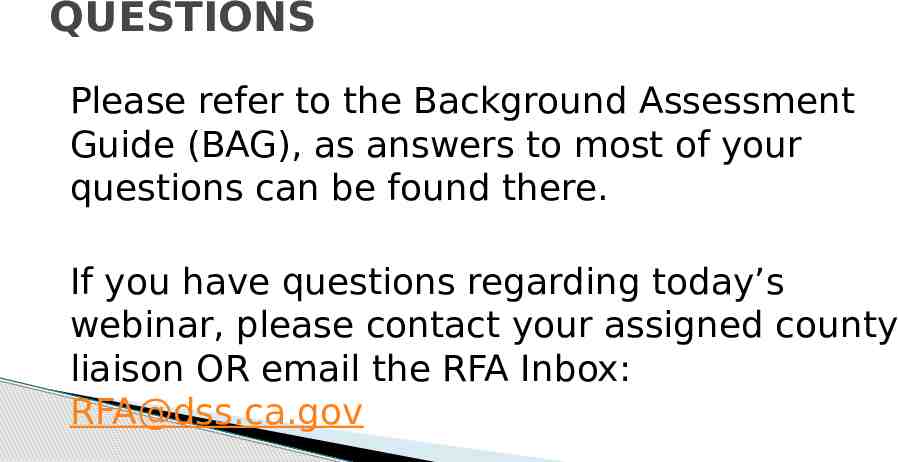
QUESTIONS Please refer to the Background Assessment Guide (BAG), as answers to most of your questions can be found there. If you have questions regarding today’s webinar, please contact your assigned county liaison OR email the RFA Inbox: [email protected]

